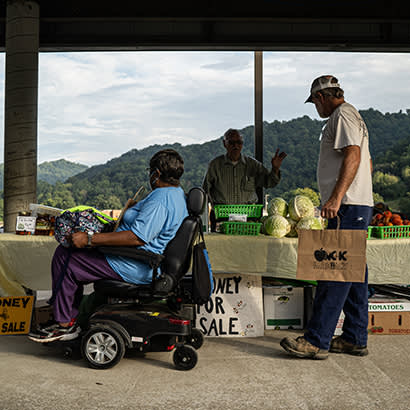
For an enhanced digital experience, read this story in the ezine.
When hard times come to the Appalachian Mountains, the first thing folks do to comfort their neighbors is offer food. When someone dies, countertops are soon covered with enough chicken and dumplings, baked ham and casseroles to see the family through. Natural disasters are no different. When a 1,000-year flood hit Eastern Kentucky in the early morning hours of July 28, 2022, the same response was triggered through relief efforts that continue today.
Serving the Community
Before the water had even crested in tiny Whitesburg, Kentucky, that day, Community Agricultural Nutritional Enterprises (CANE) Kitchen — the commercial kitchen associated with the City of Whitesburg Farmers Market working in partnership with the Cowan Community Center — began serving the first meals to evacuees from the nearby nursing home, rescue workers, volunteers and anyone who showed up hungry, wet and muddy.
In many areas, cellphone service, Wi-Fi, water and electricity would be out for days or weeks. As flood waters receded in the following days, people continued to be rescued from the more remote areas and CANE, already a hub for community gatherings, now became the frequent source of the first hot meal in days for some folks.
Wellness Hub Grant Support
For the past few years, through the Grow Appalachia program, NRPA has funded Cowan Community Center and the Whitesburg Farmers Market with a Wellness Hub grant. That support has helped the farmers market with various initiatives, such as offering double dollars for Supplemental Nutrition Assistance Program benefits at the market and expanding youth incentives to exercise and eat healthy locally-grown food.
When the grant was first awarded, probably no one anticipated the NRPA Wellness Hub support being used to comfort and nourish the victims of the worst natural disaster in Eastern Kentucky history, but while no community can ever be prepared for what happened, the grant support helped ensure the necessary systems were already in place prior to the flood and proved to be a big asset in the quick response.
As rescue and cleanup continued in this tiny community, CANE served more than 100,000 free meals between July 28 and December 31, but the Whitesburg grant recipients didn’t stop at merely feeding people hot meals. They went on to provide a free farmers market for flood victims and, with the assistance of the Lee Initiative and Community Farm Alliance, they gave away $6,000 in produce each week, even delivering to some whose cars had flooded or whose roads were impassable, serving at least 240 families.
Community Comes Together
The donations began to pour in and CANE, with its team of staff and volunteers, became a natural place for distribution. When a truckload of meat or frozen food showed up, it was distributed to those who needed it. When a semi-truckload of fresh peaches showed up from Titan Farms in South Carolina, 900 cases were distributed in a few rainy hours. CANE staff say they still see people who describe a peach cobbler or pie they made from those peaches they froze or canned. They say they’re reminded that they were a sunshine in dark times — and they continue to be reminded each time they open the freezer or pop the can.
Volunteer lawyers set up workstations at CANE Kitchen to provide free legal help to flood victims who needed help with Federal Emergency Management Agency applications, and the Foundation for Appalachian Kentucky surveyed and counted victims and then gave out grant money there.
Because four of the local schools were flooded and at least 16 school buses were destroyed, the school year began almost two months late that fall. Despite that, many parents still had to work, so Cowan’s Kids on the Creek Child Care created a program to give parents eight weeks of free childcare. Since this was the only childcare center open in the county, staff members did their best to make it feel like summer camp until school could resume. Save the Children, with support from Berea College Appalachian Fund, had professional trauma training for staff and activities for youth, and Berea musician Mitch Barrett taught the kids to write and sing songs to express how the flood made them feel.
Even with all the services provided, so much need remained for this vulnerable population that already struggled with poverty and poor health outcomes and educational expectations. Flood waters and national attention have ebbed, but Eastern Kentucky continues to have unmet needs. Continued support from partners, like NRPA, will keep these under-resourced but vibrant communities afloat.
Angie Hatton is a Freelance Writer based in Kentucky.

